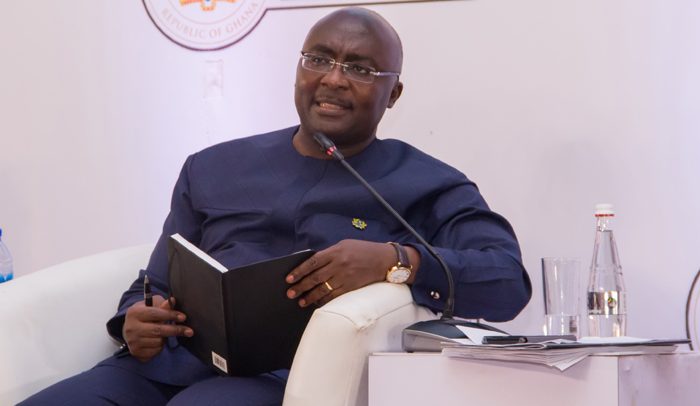Vice President Dr Mahamudu Bawumia
Vice President Dr Mahamudu Bawumia yesterday gave importers and exporters hope when he announced new measures to ease their burden at the country’s ports.
He disclosed that high import duties at Ghana’s ports have become disincentive to importers.
Speaking at the maiden Town Hall meeting with the government’s Economic Management Team (EMT) at the Physicians & Surgeons Hall in Accra, he emphasised: “We cannot be uncompetitive between Ghana and our next door neighbours. That would be just shooting ourselves in the foot. So to reduce the incidence of smuggling and enhance revenue, the benchmark delivery values of imports will be reduced by 50 per cent. However, for vehicles, the reduction will be 30 per cent.
“This is because vehicles already have an amount of depreciation which would be factored in, taking you closer to 50 per cent. This would be effective from tomorrow.”

Spontaneous applause
The announcement attracted spontaneous applause from importers and exporters, who chanted a gospel song “Aba mu awie!” to wit, their expectations had been met!
“We expect higher volumes to make higher revenue. Also, the physical examination of containers in the ports is to reduce from 90 per cent currently to 10 per cent. Customs and other government operatives at the ports should adhere to the recommendation of the government.”
Independent inspections
Dr. Bawumia also called for single inspection of containers deemed high risk by all security agencies at the ports to lessen the burden of importers.
“While nearly 90 per cent of containers that come to Tema are physically examined (i.e. they open them, de-stuff them, examine and re-stuff them), only about 5 per cent are subject to physical examination in any modern port.”
Noting that physical examination is a major source of corruption at the ports, he said “we wanted to find out how much revenue the physical examination added to revenue. The result was that it added 0.38 per cent additional revenue. So the time and the unofficial facilitation fees and the energy spent in collecting these amounts totally negate any gains these may have brought to the government.”
“Why should the cost of scanning a container, the vehicle examination fee and network charge be a percentage of the value of the goods in a container? Why should the cost of processing the documentation covering imports be a percentage of the cost of the value of the goods?” he quizzed.

High Imports
Explaining further, he said: “What was baffling us was that even though the NPP government had not increased import duties, there were consistent complaints that duties at the ports were high. So government set up ports review committee to review the competitiveness of Ghana’s ports within the West African region.”
“Here are some of the surprising findings: Except for Nigeria, the total marine charges and securities fees charged in Tema for container handling far exceed those of our key competitors. In fact, they are three times the charges in Lome and nearly twice the charges in Abidjan. No port in West Africa is charging the equivalent of the Ghana maritime security fee of nearly $20,000 per vessel in our ports. Import handling charges are higher in Tema than in any port in West Africa.”

Benchmark
He said importers complained about the benchmark values applied by customs to various commodities in the computation of import duties in Tema, saying these were much higher than in Lome, Abidjan and Dakar.
“In many cases, they are 200 per cent higher. If you take for example a Ford Focus, 2009 model, and you go to Tema, our benchmark will say it is worth $9,000. If you go to Lome, the same car will benchmark it at $3,000, the same at Dakar and also exactly as in Lome. So it’s a problem. You end up paying double the duty because the benchmarks are so high in Accra vis-à-vis Lome and Abidjan.”

Confiscation matters
“And we have a very archaic practice. Many importers are unable to pay their duties. Their cars and commodities are confiscated and auctioned very cheaply often much less than the duty paid.
Trade diversion
Touching on importers, he said data the Economic Management Team received showed that there was an increase in the diversion of trade away from Tema ports and smuggling of many items into Ghana, adding that “while container volumes in Lome, between 2013 and 2018 went up by 300 percent (i.e. 60 per cent annually), annually in Ghana between 2013 and 2016, container volumes only increased by 4.1 per cent.”
Additionally, he said: “When you go to the Lome Port, you see a long queue of trucks coming to Ghana. So because of this, Cabinet has, considering all of these, decided to have reforms at the ports.
“Cabinet is making these reforms with the objective of increasing trade facilitation and efficiency. Port revenue depends on volume. So if you don’t have trade facilitation, you will not have the volumes and if you do not have the volumes, you will not have the revenue.”

By Samuel Boadi


